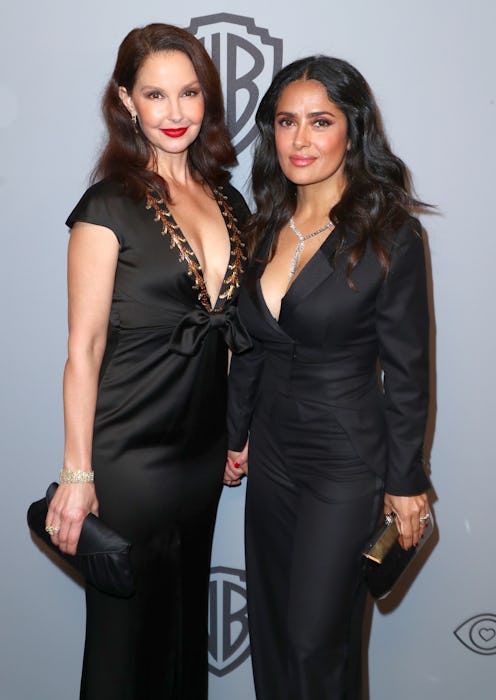Entertainment
Salma Hayek Says Ashley Judd Is The Reason She Was Able To Speak Out About Harvey Weinstein

After becoming one of the first women to publicly accuse Harvey Weinstein of sexual misconduct (Weinstein has denied all allegations of non-consensual sex), Ashley Judd is speaking out about the #MeToo movement. In an interview with Hayek, who claimed Weinstein threatened to kill her in a New York Times op-ed (in a statement, Weinstein's spokesperson denied Hayek's claims), Judd talks about finding the courage to speak out against Weinstein even if it ruined her career, and what needs to happen next so other women don't have to worry. And Hayek says that it was Judd that empowered her to come out with her own claims.
In the Town & Country interview, Judd says she was never afraid to speak up. In fact, she had been telling the same story for years. "I’ve told this story from literally the moment I left that hotel room with Harvey," she said. "My dad was with me that day, and he could tell by the look on my face, to use his words, that something devastating had happened, and I told him." But Hayek, who's been friends with Judd for 20 years, admitted that she needed more time before she could tell her Weinstein story.
"You came to me about telling my Harvey story when the New York Times article was first being reported and I chickened out," the actor said. "Just thinking about it weakened me emotionally. And if it affected me in such a way just to think about it, why would I say it out loud?"
She finally said it out loud with a New York Times op-ed, in which she called Weinstein "my monster." She accused Weinstein of not only threatening to kill her, but of allegedly demanding massages, shared showers, and oral sex. In a lengthy statement to Vanity Fair, Weinstein's spokesperson wrote “all of the sexual allegations as portrayed by Salma are not accurate." Now, Hayek says it was Judd who encouraged her to tell her story. "The only reason I was able to finally do it was your loving hand," she said. "If it weren’t for you, this story wouldn’t have come out."
While working on Kiss The Girls, Judd told the New York Times that she was sent to Weinstein's hotel room, where he allegedly "appeared in a bathrobe and asked if he could give her a massage or she could watch him shower.” In a statement to the New York Times, Weinstein's spokesperson wrote, in regards to Judd and others' claims against him:
“Any allegations of non-consensual sex are unequivocally denied by Mr Weinstein. Mr Weinstein obviously can’t speak to anonymous allegations, but with respect to any women who have made allegations on the record, Mr Weinstein believes that all of these relationships were consensual.”
But it wasn't until recently that Judd was finally about to connect those allegations to Weinstein. "I’ve been telling this story — but the seismic shift is that now everyone is willing to hear it," she said. "The tweak was naming Harvey, and I felt comfortable doing that."
Judd said that, since the Weinstein allegations, she has seen a coming together of the women in Hollywood, and she hopes it will lead to more projects that she can be proud of. "That is the greatest amends that Hollywood can make to me for having maliciously blacklisted me for something that was patently false and promulgated by a sexual predator and alleged rapist," she said. (Lord Of the Rings director Peter Jackson accused Weinstein of blacklisting Judd after the 1996 allegation; Weinstein has denied the claims.)
More importantly, though, the #MeToo movement has forced Hollywood to change. "Part of why the movement has such guts and teeth is that we’re writing codes of conduct that will be across our industry, across all the unions and agencies," Judd said, noting one important change. "No more of this meeting in hotel rooms, no more meeting at homes — it’s over."
She sees Hollywood moving in the right direction. The industry is making changes so that everyone feels more comfortable, not just in the workplace, but in speaking out about bad behavior. There is no longer the fear that speaking up will cost someone their job. Judd hopes that by talking openly about it with other women and men, there will be a support system to make sure this never happens again. And what is, at the very least, clear from this interview is that Hayek will always have her back.
If you or someone you know has been sexually assaulted, call the National Sexual Assault Telephone Hotline at 800-656-HOPE (4673) or visit online.rainn.org.